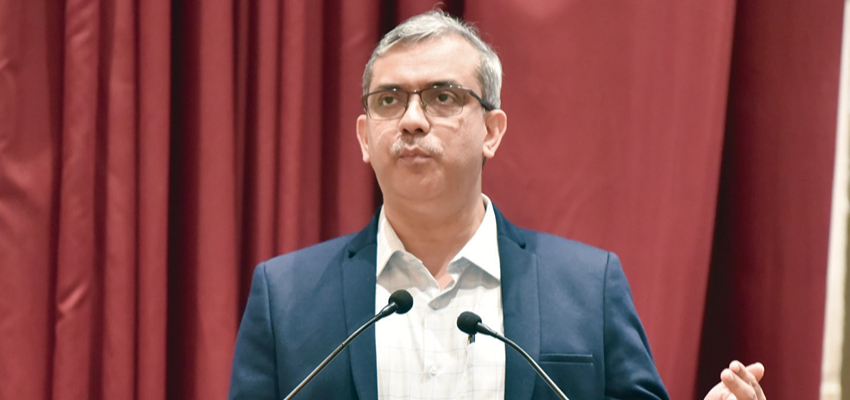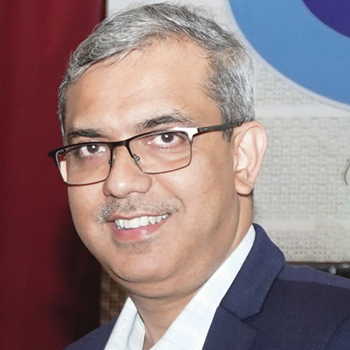Learn and Lead

Curiosity, resilience and deep love for learning has helped Rajaneesh Kini R., COO, Neurealm, to successfully lead teams across the world. He has spent over three decades solving problems using the right technology. In conversation with Corporate Citizen, he shares his insights on building smart teams, using AI to improve work, and helping people grow— always learning and leading with heart
Corporate Citizen: We would love to hear about your journey, from early engineering days to your current role as COO of Neurealm.

Rajaneesh Kini R.: My engineering journey began at Model Engineering College in Kochi, Kerala, where I laid the foundation for my passion in technology and systems thinking. This early experience shaped my interest in real-world problem solving and innovation. I started with my professional job immediately after this, but I always wanted to pursue higher degrees. After a year of working, I got back to academics to complete my Master’s in software systems from BITS Pilani and a postgraduate management degree from Symbiosis Institute of Business Management, Pune. This really changed my perspective about jobs.
I pursued further specialisation through advanced programmes, including certification in Artificial Intelligence course from Massachusetts Institute of Technology, Cambridge, and most recently, an Advanced Programme on Electric Vehicles from IIT Roorkee, underscoring my commitment to lifelong learning and staying ahead in transformative technologies.
Professionally, I’ve been privileged to work with forward-looking organisations. At Capgemini Engineering, I led a high-growth business unit focused on communications and product services. My tenure at Wipro as VP, Engineering R&D, enabled me to steer a 13,500-member global team through phases of growth and operational transformation. As CTO at Cyient, I was privileged to drive the evolution into an intelligent engineering organisation, focusing on AI, cloud and embedded systems.
Now at Neurealm as COO, I oversee global delivery, technology practices, Neurealm labs, as well as IT and chief information security officer (operations). My focus is on shaping an agile, technology-first organisation that empowers innovation and growth, and leverages AI for everything we do.
This has been an exciting journey of over 31 years, starting from early engineering days to now. Each chapter in my journey has deepened my belief in the power of people, commitment to purpose, and progress through technology.
"Staying creative in a busy day is about making intentional choices. It's about recognising that creativity isn't a luxury but a vital component of effectiveness, and then proactively building the habits and structures to nourish it"
— Rajaneesh Kini R.
CC: You've managed teams around the world, what's your approach towards building a strong and happy team?

Building strong and happy teams, especially across borders and cultures, has always been a core part of my leadership philosophy. I believe the foundation lies in three principles:
Clarity of Purpose or Vision: Every team member should clearly understand their purpose, goals, and how their work contributes to the larger mission. Whether in Capgemini, Wipro or now at Neurealm, I've focused on defining crisp roles, KPIs, and measurable outcomes. End goal of a leader should be to create the purpose that drives the team together. This will make them feel empowered, not micromanaged.
Connecting the people: Managing global teams means embracing diversity—not just accepting it, but weaving it into the way we work. I make it a priority to foster open communication, cultural inclusiveness and trust. Understanding each individual’s strengths and leveraging them well is the first step for a manager. But, most critical next step is to ensure everybody in the team understands each other. That is not easy to achieve in an ever-changing IT landscape. What helped me from early days is that my mentors and managers always promoted the feeling of being part of a family at work. At Wipro, which I consider as my learning ground as well as a leadership lab,I got several opportunities to experience and learn various aspects of this. As part of the job, I also had to travel and live in Europe, UK, USA and in Australia. This helped me with a global perspective, which otherwise will never be easy to learn from books. I was humbled to receive the 'Best People Manager Award' from Azim Premji, the chairman of Wipro, which to me reflected the power of deep engagement and empathy.
Empowerment and enabling growth: Successes big or small, deserve to be seen, and it fuels even more motivation. People thrive when they feel empowered and have opportunities to grow themselves. Creating an environment that enables individual growth as well as organisation growth, is important, which comes through: Delegating effectively: Giving team members ownership of tasks and projects, even if it means stepping back and letting them learn. Delegating at the right level is key—not more not less. Providing resources for individual and team development: Ensuring they have the tools, training and support, they need to succeed. This could be access to forums, people or technology. Providing feedback and recognising achievements: Celebrating successes of the team, both big and small, boosts morale and reinforces positive behaviours. However, it is equally important for each member to know that there is someone who cares for their improvements and provides them with right feedback at every stage.
CC: People describe you as a "cool-headed but action-driven" leader. Has there been a time where that mix really worked well?
Absolutely—it’s a style that I have probably learned from my mother and fine-tuned through experience, especially in high-pressure and high-growth environments.
One moment that stands out is during my tenure at Wipro, when we undertook a massive global delivery transformation across three new geographies: Tier-2 cities in India, Romania and Mexico. It was a high-stakes initiative—we were expanding our footprint, serving demanding clients across verticals, and aligning 13,500 people to new delivery models. Midway, we hit geopolitical disruptions in one region, talent acquisition delays in another, and an unexpected budget constraint that could have derailed the timelines and plan.
Instead of reacting with urgency alone, I anchored the team around clarity and calm. We reprioritised deliveries, empowered local leadership, and doubled down on transparent client communication. I personally joined several clients and took internal calls to steady the ship, and made space for teams to bring creative solutions forward. Within three quarters, not only did we stabilise the expansion, but we achieved 26 per cent annual growth while improving margins by 10 per cent.
CC: What's one lesson you always try to pass on to people you mentor?
One lesson I always try to pass on is, adaptability is your superpower, if you pair it with right intent. Adaptability without intent is chaos—intent without flexibility is rigidity.
In today’s tech landscape, change isn’t the exception—it’s the constant. It could be new tools, new technology, new geographies and cultures or a new challenge, like what happened with Covid pandemic in 2020. What makes a real difference is not just reacting to change, but preparing well and responding to it deliberately.
I encourage people to build an Adaptable Core: Stay curious and keep learning—not just tech, but people, business, and even philosophy. Reading and learning, specifically learning with students, makes you ready for challenges, just like a gym keeps you physically fit.
Know your values and goals—your values and goals stay with you for long term. So, when everything shifts, you’re not shaken but you know what is more important and what is less important. In my personnel experience, I felt travelling makes you increasingly aware of your inner self and what your values are.
To emerge as a leader — speak up, be confident, have right people around you, suggest bold ideas, and experiment with them yourself.
CC: You've led projects in multiple sectors including AI, cloud, security, automobile and hardware. How do you stay on top being multiskilled?
By staying curious and continuously learning. When you go back to learning along with students or your own colleagues, it gives you the power of learning from networking. It creates what I call artificial intelligence, by collecting and connecting knowledge that each person in your network has. So, if you know someone who is really on top of each of these technologies, you just need to get him in your network and leverage that teaming to be relevant in the industry. Not a single individual can be on top for each of these technologies. But as a team, I have always managed to get to the leadership position for my organisation.
"Creativity isn’t a solo act. I surround myself with diverse thinkers, encourage dissent, and create psychological safety, so bold ideas can breathe"
CC: You have worked closely with clients and internal teams. How do you handle tricky situations where people don't agree?
Understand before solving. I always begin by listening deeply to not just the words spoken, but try to understand each person in the team, as to what is most important for them. For example, a superstar technologist may not want to fail in an argument related to technology. But, they like it when you make them think in the right direction. Whether it’s a client escalation or a cross-functional misalignment, people want to feel heard. I ask probing questions to get to the root—not just 'what happened', but 'why it matters' to each party. This builds trust and feeling of being at home. If everyone gets what they want from the job and environment, then the team will achieve its objectives easily.
CC: People say you're honest and direct. How do you keep that balance between being real and being respectful?
Whether it is delivering feedback or addressing an issue or general feedback, it is important to centre the conversation around the action, behaviour or situation itself, rather than making it about the person's character or inherent abilities. For example, instead of saying "You're always late with your reports" I would say "The report for Project X was submitted after the deadline, which impacted the team's ability to finalise our presentation". This shifts the focus to an observable fact that impacted the outcome and can be discussed and improved upon. Honesty is about being factful with data rather than perception.
Communication needs to be timely, clear and within the required privacy as per the topic. Addressing issues sooner rather than later, prevents one from festering or becoming bigger problems. Vague feedback is unhelpful. When being direct, I ensure my message is specific about what needs to be changed or improved. For instance, instead of saying "You need to communicate better", I might say "Please send a brief email update to the team by 3 pm every Friday, outlining your progress on tasks A, B and C". I always deliver constructive feedback in a one-on-one setting, never in front of others. Such feedback may have even better impact when you take out time for a coffee or lunch with the person, rather than in a manager to employee setup. Similarly, public criticism is rarely productive and often humiliating. Such minor details make the cut rather than the content of the communication or feedback.
It is also important to understand the individual’s circumstances and thought process, when communicating with a team. Before I speak, I take a moment to consider following: What situation are they going through personally? What might be their understanding of the situation? What challenges might they be facing? If my intent isn't genuinely constructive, I'll rethink my approach or even what I need to say. I also try to deliver the message with empathy, acknowledging any difficulties they might be experiencing.
"In today’s tech landscape, change isn’t the exception—it’s the constant. It could be new tools, new technology, new geographies and cultures. What makes a real difference is not just reacting to change, but preparing well and responding to it deliberately"
CC: You're known for bringing in fresh ideas. How do you keep your creativity going when the day-to-day gets busy?

I reflect on this often. Creativity, especially in leadership, isn’t just about having ideas, it’s about making space for them to emerge, even amidst the chaos. Stephen Covey’s books have deeply influenced how I approach this. As per his timeless principles, it's essential for long-term effectiveness.
Here's how I approach it:
Sharpen the saw: Conscious self-renewal is paramount. Creativity isn't an endless well, it needs replenishment. Stephen Covey emphasises renewal in four dimensions: physical, mental, social or emotional and spiritual. Covey’s book, First Things First, also taught me to distinguish between what’s urgent and what’s important. I block time for “deep work”—thinking, exploring, and connecting dots across domains. It’s not easy, but it’s non-negotiable if I want to lead with vision, not just velocity.
Physical: Physical activities are non-negotiable for mental clarity and energy. A quick walk, even just 15 minutes, can clear my head and often spark new connections.
Mental: Even if it's just 30 minutes a day, I make time for reading books, blogs, even newspaper as well as listening podcasts. Try to write something new and create your own content. What has also helped me immensely is going back to learning with students on various topics.
Social or emotional: Engaging with different people and perspectives fuels creativity. I make an effort to connect with diverse networks, forums and students—talking to people outside my immediate team or industry often brings fresh viewpoints.
Spiritual (purpose-driven): For me, this involves reconnecting with my personal "why" and the mission of my work. When I understand the deeper purpose, it provides an intrinsic motivation to seek innovative solutions. This might also involve having right people around you in both personnel and professional environment. Strong relationships provide a support system, and a safe space to explore half-formed ideas.
Synergise: Collaborate for collective creativity. Stephen Covey says “Find your voice and inspire others to find theirs”, which reminds me that creativity isn’t a solo act. I surround myself with diverse thinkers, encourage dissent and create psychological safety, so bold ideas can breathe. Stephen Covey defines synergy as "The habit of creative cooperation". My own creativity is amplified when I engage with others.
I actively seek out different viewpoints and involve team members with varied backgrounds and expertise in brainstorming sessions. The "whole is greater than the sum of its parts" when diverse minds come together. It is important to create a safe environment that encourages everyone to share ideas, no matter how nascent or unconventional, without fear of judgment. This collective courage is a breeding ground for true synergy.
In essence, staying creative in a busy day is about making intentional choices. It's about recognising that creativity isn't a luxury but a vital component of effectiveness, and then proactively building the habits and structures to nourish it. Even in the busiest weeks, these principles help me stay grounded and keep the spark alive.
CC: Is there a new tech trend you're really excited about right now?
Everyone in the industry are excited about the possibilities that AI and GenAI brings in. Obviously, it is the most important boardroom topic currently and needs serious investment from the organisations and individuals. I look at AI tools and technologies to bring in five impacts to the organisation:
- Reduce costs
- Improve work-life balance
- Help with better decision making
- Improve customer experience through AI led features or services
- Anticipate or reduce the risks in business.